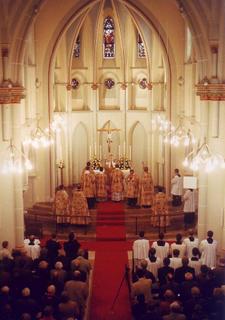
"Perhaps there is an allusion to an Old Testament notion: the plan of the temple as the seat of the presence of God recognized degrees of sanctity. Only the high priest, once yearly at the feast of atonement, went into the innermost sanctuary, into the holy of holies. Since the incarnation the temple of God, in whom the fullness of the Godhead is pleased to dwell, has become the physical person of Jesus; in the saying 'Tear this temple down and I will build it again in three days' Jesus shows himself conscious of this change. He becomes the place of God's presence and of the worship of God. 'Woman, believe me, the hour is coming when you will worship the Father neither on this mountain nor in Jerusalem. You worship what you do not know; we worship what we know: for salvation comes from the Jews. But the hour is coming, and is already here, when those who truly worship the Father will worship him in spirit and in truth, for such the Father seeks to worship him' (John 4.2I-3).
"And Jesus is not a worshipper among others, he is the supreme worshipper in whom all worship in spirit and truth is concentrated, is made perfect in truth as it is purified, is transformed in the Spirit; in him everything which strives towards the holiness of God, which desires to participate in it, is drawn into and set alight by the fire of the holy of holies. But why not reserve the phrase 'holy of holies' for God the Father in heaven, why use it to refer to the Eucharist of the Son of God?
"Because it is here that the two flames fall upon each other: the holiness of heaven falling down like fire on the earth, devouring the earthly prayers and sacrifices, and the holiness rising up to heaven of the man who obeys and offers himself and is devoured for the sake of all men, on whom God's pleasure rests and whom God transfigures on the mountain into his uncreated light. It is not possible to conceive of anything more intensive, more devouring, more compelling than this encounter of the two fires which fuse into one."
Hans Urs Von Balthasar, Elucidations

No comments:
Post a Comment